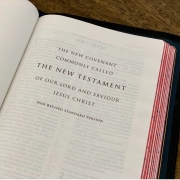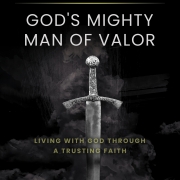“Jesus did many other things as well. If every one of them were written down, I suppose that even the whole world would not have room for the books that would be written.”
– John [21:25]
I am frequently asked about the historical accuracy of the four Gospels. Over the years, skeptics have said they are not history but a legendary account to appease a group desiring it to be real. My research finds this assessment remarkably wrong.
From a 21st-century perspective, where writing is far more prolific than in the 1st century and many times with a specific agenda, it is not surprising some would be suspicious of the accuracy of the Gospels and other writings in the New Testament.
But we must be careful when we evaluate writings from the 1st century using our 21st-century state of mind. Doing this is called Presentism. And when we use Presentism, we can distort the truth.
Instead, we need to insert historical context into our evaluation. The 1st century was a different time, and writing history was less about agenda and more about getting the facts right. While all books, even from the 1st century, include agenda, but to a lesser degree than today in the 1st century.
Additionally, less than 5% of the population could read or write because of the low literacy rate. Thus significantly fewer writings occurred, and those that did were a serious undertaking. 1st-century authors like Ovid and the Apostle Paul, who did write books, had higher standards. Additionally, their efforts were hampered compared to the modern authors; no programs like Word or computers existed. There were no typewriters; writing each sentence required patient thought.
In our century, over one million books are written every year! In the first century, less than one hundred books exist for the entire hundred-year period. Most were written in Latin or Greek. The books in the New Testament, twenty-seven in total, represent a large portion of what was written in the first century. Half of these were written by the Apostle Paul or his students. Most of the New Testament was written by the start of the second century. Making Christian literature or history the most significant genre of the 1st century.
While certainly specific agendas existed, there is a high level of consistency in the New Testament books. All are centered on Jesus and his teachings. The consistency of thought and facts across all these books supports a high level of accuracy.
While some will point out the inconsistencies, most are explained by understanding the perspective of the individual writers, not that they disagree with another person’s account. Instead, they saw the events from a different lens. So, while we would all like one book to explain Jesus and his life fully, he was a rich and dynamic presence that affected everyone differently. As such, each writer, inspired by God, wrote from their viewpoint.
In the Gospel of John, we find an exciting verse that explains why so much has been written about Jesus. John [21:25] says, “Jesus did many other things as well. If every one of them were written down, I suppose that even the whole world would not have room for the books that would be written.” Thus when we read about Jesus, we can enjoy the many different perspectives of his life.
Another support for the accuracy of this story is there were over five hundred eyewitnesses to the risen Jesus. The Apostle Paul wrote about these witnesses in 1st Corinthians, published in 50 AD. (1st Corinthians 15:4-8) In his account, he also declared many were still alive seventeen years after the first Easter week.
Why is this important in proving accuracy? First is knowing Paul would not idly mention this fact unless it was real. Paul himself was a man who was well educated and zealously riveted on getting the facts right. Secondly, others widely read this letter, and the document could easily be checked.[1]
Paul’s letters were written around twenty years after the resurrection. When many who observed and knew about the events of Jesus were still alive, if Paul were incorrect or embellishing his facts, there would undoubtedly be disagreement. However, none exists from this period.
Additionally, the characters of the New Testament actually existed. Take Pontius Pilate; archeologists in 1961 discovered a small statue in the town of Caesarea.
The inscription on the statue written in Latin says, “Pontius Pilate, Prefect of Judea, has presented the Tiberium to the Caesareans.[1]
Another main character and Jesus’ primary foil during the Easter week is the high priest, Caiaphas, who also was a real person. Caiaphas presided over the religious trial of Jesus and was directly responsible for Jesus’ death. In 1990 his burial box with his bones was discovered in the old city section of Jerusalem.[2]
Paul, who either himself or his students wrote half of the books in the New Testament, was widely quoted by non-Biblical writers – authors such as Clement (95AD), Polycarp, Papias, Irenaeus, and many others. From a non-Biblical basis, Paul and his writings were perhaps the most quoted by 1st and 2nd-century scholars/writers.[3]
Additionally, several writers from the late first and early second century have written accounts that validate the Gospels, scholars such as – Irenaeus, Eusebius, and Polycarp.
Polycarp, in particular, is important. He was a student of the Apostle John, and much of his writing emanates from his time with John. In many of his writings, he frequently refers to several books in the New Testament.[4]
The Polycarp writings are most important because we have a scholarly writer who had a close relationship with a first-hand eyewitness to Jesus and his life, the Apostle John. For me, this was an important and exciting revelation. In Polycarp, we have a person who spent a good deal of time with a direct eyewitness to Jesus and his ministry – a fantastic gift for us in the 21st century.
While little known amongst the general populace, Polycarp is well-known by Biblical scholars and frequently cited in articles.
Another clue in the authenticity of the Jesus story comes from a Roman historian and Senator, Tacitus. In 116 AD, in his final book called Annuals, he confirms that Jesus was crucified and writes about early Christians in Rome.[5]
Tacitus is important because a non-Christian confirms the event. Many scholars have confirmed this writing to be authentic, and it is one of the earliest non-Christian accounts of the crucifixion and persecution of Christians.
Further proof is the cities mentioned in the Gospels existed precisely as mentioned, as did the buildings mentioned. Furthermore, the customs written about in the Gospels are also accurate. Particularly the traditions surrounding the Passover dinner that was Jesus’ last supper, including the details of the supper’s preparation.
While we have proof of the existence of many of the characters and well-respected authors, the New Testament is also a remarkably “stable” document in its consistency. Despite centuries of revisions and translations, a literary critique of the New Testament has a ninety percent score on consistency. A very high score for a document that has been so frequently revised and translated.
Some will say, “How can a document that has been revised still be accurate?” Yet well over five thousand scraps of ancient documents have been discovered, which all support the words of the modern New Testament.
While there is much evidence of the accuracy of the New Testament and the four Gospels, they are not enough to fully convince an individual of the New Testament’s accuracy. An easier path exists. Spending time reading the Bible will create a stronger belief in the words of the Bible and the New Testament.
One way to do this is to read a chapter starting with the first chapter in Matthew each morning. Pray after the reading. But when you pray, wait for quiet to come into your mind. Repeat this daily. After a while, doubt will start to be replaced with assurance.
[1] Webb, Demer, Explore the Story, https://explorethestory.wordpress.com/2016/04/14/whats-up-with-those-500-witnesses/ , April 2016.
[2] Stewart, Don, The Amazing Historical Accuracy of the Bible-Question 12. https://www.blueletterbible.org/Comm/stewart_don/faq/historical-accuracy-of-the-bible/question12-gospels-historically-accurate.cfm
[3] Ibid
[4] Oakes, John, Is There Any Clear Evidence Paul Existed. https://evidenceforchristianity.org/is-there-any-historical-evidence-that-paul-was-a-real-person/, February 2nd, 2015.
[5] Policarpo (santo, vescovo di (2013-07-25). Polycarp’s Epistle to the Philippians and the Martyrdom of Polycarp: Introduction, Text, and Commentary. University Press. ISBN 978-0-19-922839-3.
[6] Tacitus, The Annals, book 15, chapter 44



 John had a large number of loyal friends, primarily because of his humbleness. John could have easily been more successful outside the church world. I am sure he would have risen the ranks quickly in private industry and been compensated far more than he was with the church. But Jesus put John to work in the church, and John knew this. Sure he expressed frustrations with the imbalance in his pay. But he continued steadfastly doing his job at a very high level.
John had a large number of loyal friends, primarily because of his humbleness. John could have easily been more successful outside the church world. I am sure he would have risen the ranks quickly in private industry and been compensated far more than he was with the church. But Jesus put John to work in the church, and John knew this. Sure he expressed frustrations with the imbalance in his pay. But he continued steadfastly doing his job at a very high level.






